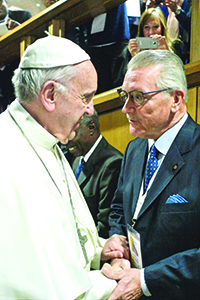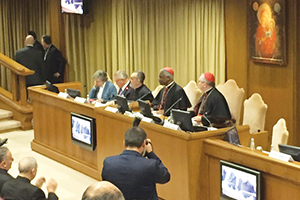By JULIE MINDA
When it comes to health care access and outcomes, there is great disparity between rich and poor countries. But even within affluent countries, wide disparities exist in health care access and outcomes related to wealth and poverty. It is incumbent upon Catholic health care providers around the world to help close those gaps.

Pope Francis greets Tony Tersigni, Ascension's president and chief executive, at the Vatican conference on global health care inequities.
That was a key theme of an international conference on health care that the Vatican held late last year. By sharing resources, information and talent, Catholic health care providers around the world can help to attack root causes of poverty and illness and improve health care quality, particularly for the most vulnerable, presenters said at the Nov. 16-18 Vatican gathering.
The 32nd International Conference Addressing Global Health Inequalities attracted several hundred attendees and presenters. They included top Vatican officials and leaders representing Catholic health care providers, health associations and social service organizations around the world. Representatives of global health care agencies including the World Health Organization also attended, as did bankers, drug makers and leaders of other private sector businesses.
In a message read to participants, Pope Francis called on conferees to "address the specific issue of inequalities and the social, economic, environmental and cultural factors underlying them. The church cannot remain indifferent to this issue," he wrote.
Tony Tersigni, president and chief executive of St. Louis-based Ascension, is past head of the confederation that co-hosted the conference. Tersigni said in focusing on the topic of disparities, the Vatican also is calling on ministry providers to do more than they are doing now. Tersigni said the Vatican's Dicastery for Promoting Integral Human Development is exploring ways to help Catholic health care providers worldwide better share information so that pressing needs can be identified and collaborations formed to address unmet health care needs.
Tersigni said conference presenters emphasized that Catholic health care providers make up an international community that is united in a mission to care for the poor and to pursue the common good.
A right, not a privilege
The Dicastery for Promoting Integral Human Development and the International Confederation of Catholic Health Care Institutions hosted the conference.
Formal presentations made by health care experts from around the world described economic forces underlying health care disparities, global epidemiology, practical approaches to particular health challenges in various countries, dynamics of the relationship between clinician and patient, the impact of technological and pharmaceutical innovation, bioethical and legal considerations at play in health care, effective health care management, palliative care delivery, formation, Catholic identity and research.
Rocklon "Rocky" Chapin, who retired in January as president and chief executive of Duluth, Minn.-based Benedictine Health System, said some of the common threads running through the presentations were that health care is a right, and not a privilege; that health care should be a not-for-profit or public enterprise; that solving public health issues like the lack of potable water in some developing economies will help reduce disparities; and that the Catholic health care ministry globally must work together and with collaborative partners to combat issues of inequality.

Among those taking part in a panel at the 32nd International Conference Addressing Global Health Inequalities are, seated from left, Sr. Carol Keehan, DC, CHA president and chief executive officer; Tony Tersigni, president and chief executive officer of St. Louis' Ascension; Rev. Msgr. Segundo Tejado Muñoz, undersecretary of the Dicastery for Promoting Integral Human Development; Cardinal Peter Kodwo Appiah Turkson, prefect of that dicastery; and Cardinal Pietro Parolin, secretary of state of the Holy See.
The pope and multiple presenters seemed to express skepticism of private market solutions to health care inequality, said Kathy Curran, CHA senior director of public policy. She staffs CHA's committee on diversity and health disparities. Curran said several presenters spoke of the direct negative effect of poverty and poor economic conditions on health access and outcomes. The pope and others held out hope that solutions would come not only from the public and not-for-profit sectors, but through changes in approach by for-profit entities as well. For example, in his message, Pope Francis called for drug companies to function more altruistically and not be driven purely by profit motives.
Some presenters noted that business can play a positive role in fighting disparity by developing new technologies and by providing financing tools to help build income in poor countries.
Curran said the presenters talked about the need for solidarity and the need to look toward solutions that provide for the common good. They emphasized the interdependence of people in the global community.
Fr. Tom Nairn, OFM, recently elected provincial of the Franciscan Friars of the Sacred Heart Province and former CHA senior director, theology and ethics, moderated a section of presentations at the conference. He said that in an address at the conference, the head of the dicastery on integral human development, Cardinal Peter Kodwo Appiah Turkson, emphasized the urgency of combatting health care disparity. The cardinal decried the fact that millions of people worldwide are dying from curable illnesses every year. The cardinal said the global health ministry must challenge itself to deal with these preventable deaths.
One ministry
Celeste Mueller, Ascension vice president of ministry formation, presented at the conference on the approach Ascension uses for formation. She said as a conferee, she was profoundly moved by the many examples of committed, spiritually grounded people in Catholic health care working to meet the needs of vulnerable, suffering people. She said the conference reinforced for her the importance of Catholic providers working in concert to tackle health disparity on a global basis.
Fr. Nairn said, "The Catholic (health) ministry does not usually tend to think of itself in global terms, but the conference showed that issues like poverty, war and violence are very much tied to health care, and that these issues connect us to one another."
In his message to the conference, Pope Francis said that compassion is an indispensable element of Catholic health care. Sr. Carol Keehan, DC, CHA president and chief executive officer, presented at the conference on this concept as it pertains to palliative care. She said palliative care clinicians must address people's needs in a compassionate, holistic way to promote the quality of life for people with serious, chronic illness and terminal illness. Palliative care demonstrates the ministry's belief in the inherent value and dignity of every individual, Sr. Carol told conference attendees.
Chapin said the conference reinforced for him that health care is the work of the church, a vocation undertaken "in the context of who we are, what we believe and what we stand for. This conference reaffirmed (the Catholic health ministry's) commitment to working toward the common good. And it brought new energy to that commitment," he said.
Copyright © 2018 by the Catholic Health Association
of the United States
For reprint permission, contact Betty Crosby or call (314) 253-3490.